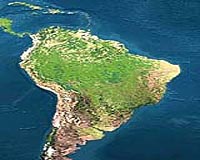| . |  |
. |
Beijing (AFP) Sept 6, 2010 China has vowed to make it easier to import goods into its huge market as Beijing seeks to address controversial trade surpluses with its trading partners, a report said Monday. Beijing will "loosen its regulation of imports, cut import costs and make import financing easier for domestic companies," among other measures, said Chong Quan, a top trade official, according to Dow Jones Newswires. Chong, who is the commerce ministry's deputy China International Trade Representative, added that the government will encourage imports from nations with which it is running a trade surplus, the report said. China also will actively import energy, advanced technology and other equipment, Chong said at a trade forum in the capital. The report did not mention any further details of measures China would take. China overtook Germany last year to become the world's top exporter. Its foreign exchange reserves stood at 2.45 trillion dollars at the end of June -- also the largest in the world. China's export success has consistently drawn criticism from major trading partners such as the United States, with which it runs a large trade surplus. Washington has long pushed China to import more foreign goods. Foreign pressure for a stronger Chinese currency has also mounted, with critics including US lawmakers claiming the yuan is undervalued by as much as 40 percent, giving China's exporters an unfair advantage. The People's Bank of China pledged in June to let the yuan trade more freely against the dollar, but the currency has changed less than 0.7 percent since then. The yuan had been effectively pegged at about 6.8 to the dollar from mid-2008, when the global financial crisis started to bite.
earlier related report "The Shenzhen Special Economic Zone created a miracle in the world's history of industrialisation, urbanisation and modernisation and has contributed significantly to China's opening up and reform," Hu said on a visit to the southern city, which borders Hong Kong. "The central government will, as always, support the brave exploration of the special economic zone as well as its role of testing and carrying out reforms ahead of others," state-run Xinhua news agency quoted him as saying. Once a sleepy fishing village, Shenzhen is widely viewed as the cradle of China's dramatic transformation into a world economic and trade juggernaut. In August 1980, it became the first area in China to be designated as a special economic zone that could accept foreign investment, under reforms pioneered by late paramount leader Deng Xiaoping. It offered lower taxes and less red tape to attract the overseas investors whose factories -- staffed by China's abundant cheap labour -- set the mould for the country's explosive manufacturing-based economic growth. Shenzhen's location next to Hong Kong gave investors access to the deep pockets of the international financial hub and easy access to the former British colony's port. Several other special economic zones followed, in the nearby cities of Zhuhai and Shantou in Guangdong province, the port of Xiamen in the southeastern province of Fujian and the southern island of Hainan. The reforms touched off an annual economic growth rate of 25.8 percent over the past 30 years in Shenzhen, compared with about 9.8 percent for the entire country, according to government figures. The population has ballooned to nearly nine million people, most of them members of China's huge army of migrant workers, according to official data. Authorities expanded the area of the zone about five-fold to just under 2,000 square kilometres (770 square miles) this year, nearly the size of Luxembourg. Located in the Pearl River Delta, the heartland of China's export-oriented economy, Shenzhen boasts one of the highest minimum wages in China at 1,100 yuan (160 dollars) per month, compared with just 600 yuan in the poor central province of Henan. It is home to a number of high-tech firms, including Taiwanese IT giant Foxconn, which employs more than 400,000 people in the city where it makes products for Apple, Panasonic and other top brands. Shenzhen, however, is often pointed to as a symbol of some of the social problems attending the Chinese economic model. Foxconn has come under heavy criticism over working conditions at its factories after 13 Chinese employees committed suicide this year at the company's plants and an affiliate, including 10 in Shenzhen. State media reports have also decried the city's thriving prostitution and other ills, while a corruption scandal toppled its mayor Xu Zongheng last year. But Hu took the occasion Monday to reiterate the government's commitment to stay the course. He said China must "continue to push forward the grand course of opening up and reform, and the socialist modernisation." Wang Rong, the Communist Party chief of Shenzhen, told a rally that the city would continue to act as a trail-blazer for the nation, and would build itself into a "modern and international" metropolis, Xinhua reported.
Share This Article With Planet Earth
Related Links Global Trade News
 Commodity exports Latin America's mainstay
Commodity exports Latin America's mainstaySantiago, Chile (UPI) Sep 3, 2010 Most of the Caribbean and Latin American countries did well with their commodity exports in the first half of this year but economic planners in those nations need to diversity and increase the ratio of processed goods and manufactures in their earnings abroad, a U.N. report said. The U.N. Economic Commission for Latin America and the Caribbean issued the reminder to regional leaders no ... read more |
|
| The content herein, unless otherwise known to be public domain, are Copyright 1995-2010 - SpaceDaily. AFP and UPI Wire Stories are copyright Agence France-Presse and United Press International. ESA Portal Reports are copyright European Space Agency. All NASA sourced material is public domain. Additional copyrights may apply in whole or part to other bona fide parties. Advertising does not imply endorsement,agreement or approval of any opinions, statements or information provided by SpaceDaily on any Web page published or hosted by SpaceDaily. Privacy Statement |